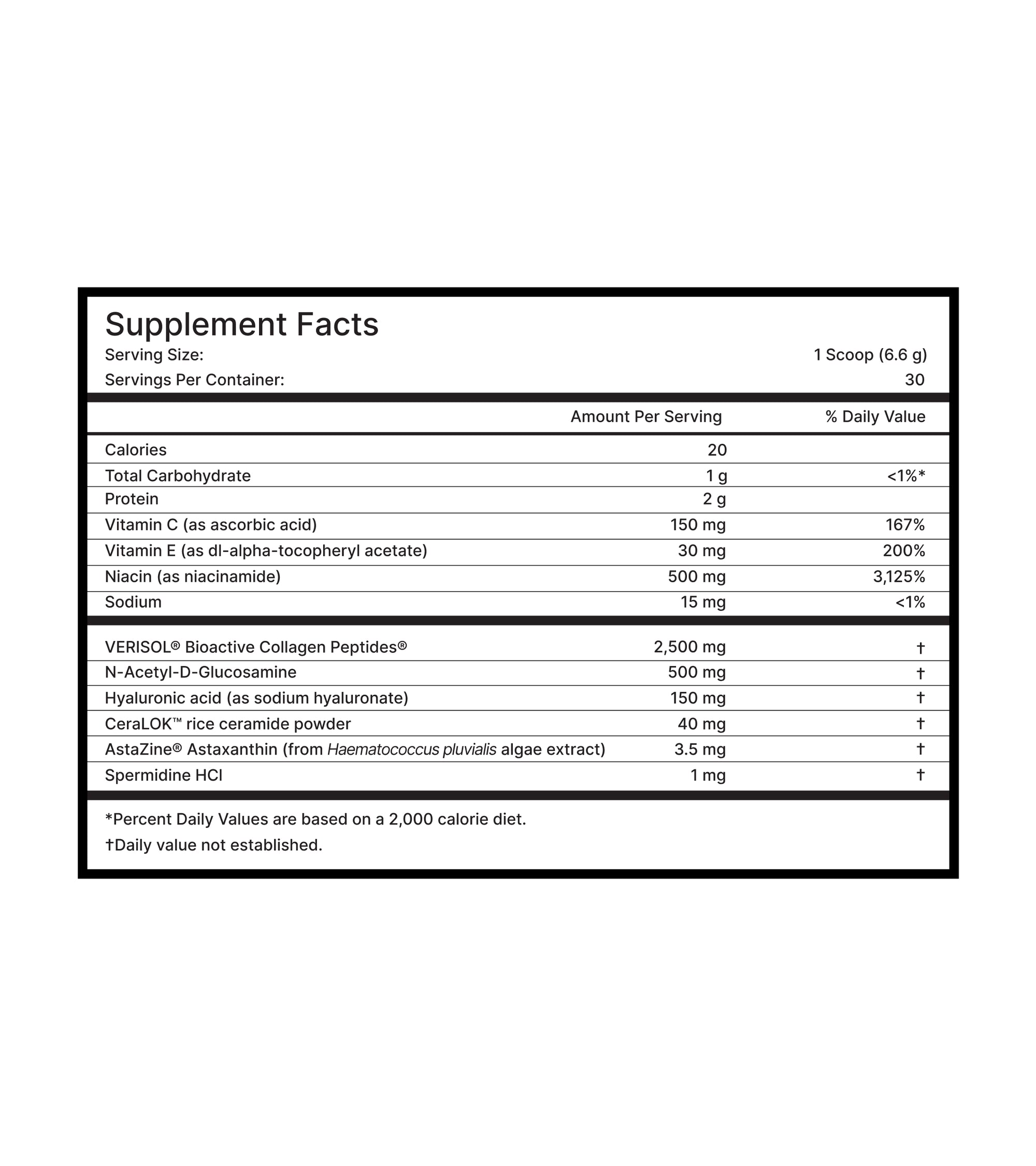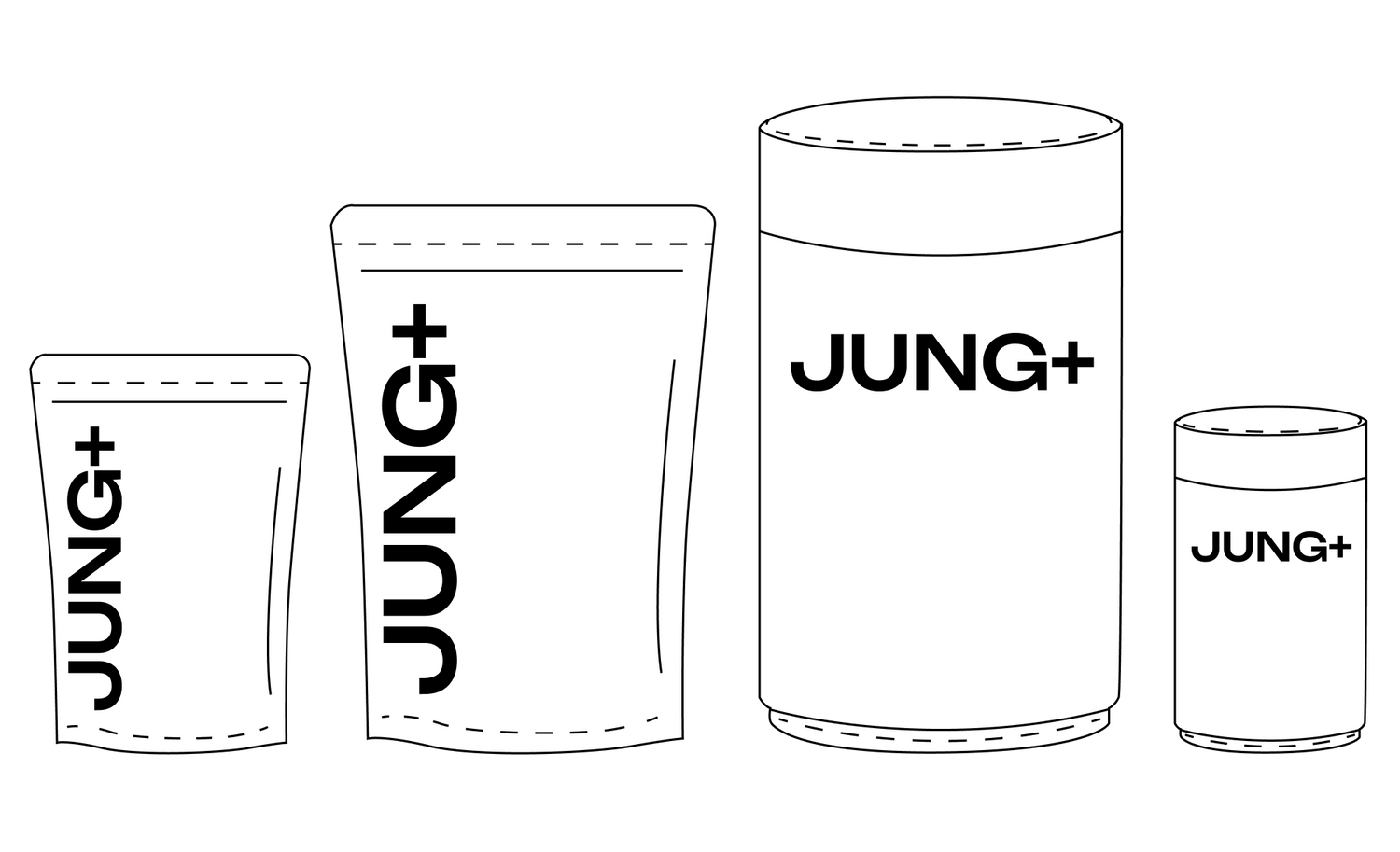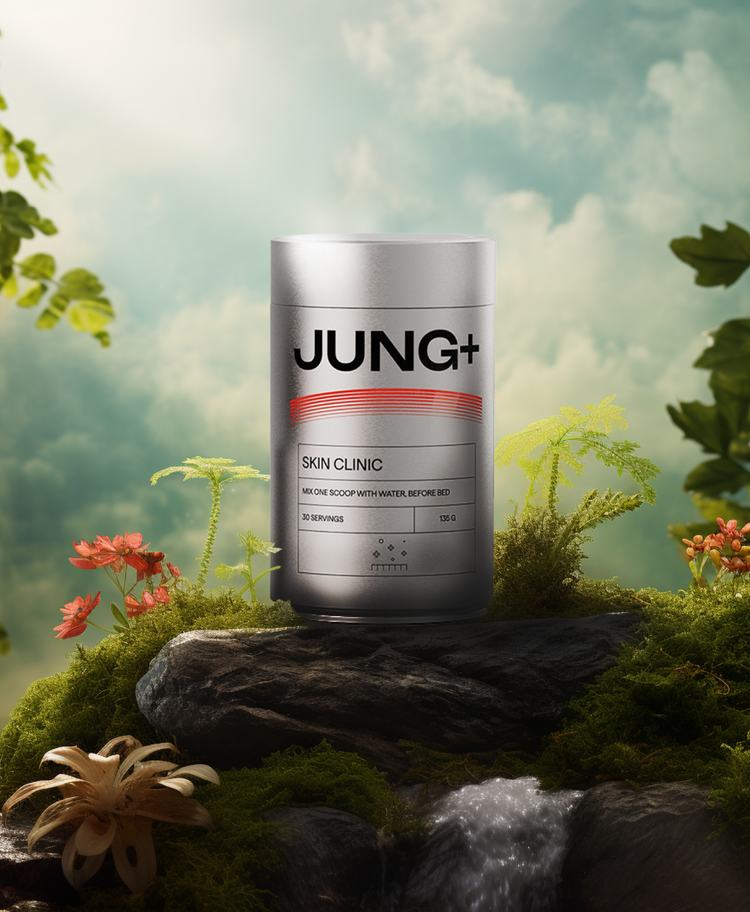Cellular Skin Renewal
Cellular Skin Renewal transcends the limitations of topical creams or serums, standing alone as the only skin supplement leveraging the cutting-edge advancements of longevity science to combat every major aspect of biological skin aging from the inside out. Precision engineered using frontline longevity science, it's a complete protocol that targets the multifaceted drivers of skin aging, helping to bolster cells and capillaries, clear our senescent zombie cells, stimulate NAD+, collagen and hyaluronic acid production, neutralize aging accelerators like Advanced Glycation End Products (AGEs) from eating sugar, and more. This groundbreaking formula serves as a personal longevity clinician, designed to reduce wrinkles, improve elasticity, and balance skin tone and texture by correcting the things that cause them. With its powerful blend of precursors, antioxidants, and longevity molecules, Cellular Skin Renewal goes beyond skincare —it's a testament to the pinnacle of longevity science and skin rejuvenation.
Couldn't load pickup availability
As seen in
Target every hallmark of skin aging, in a single protocol

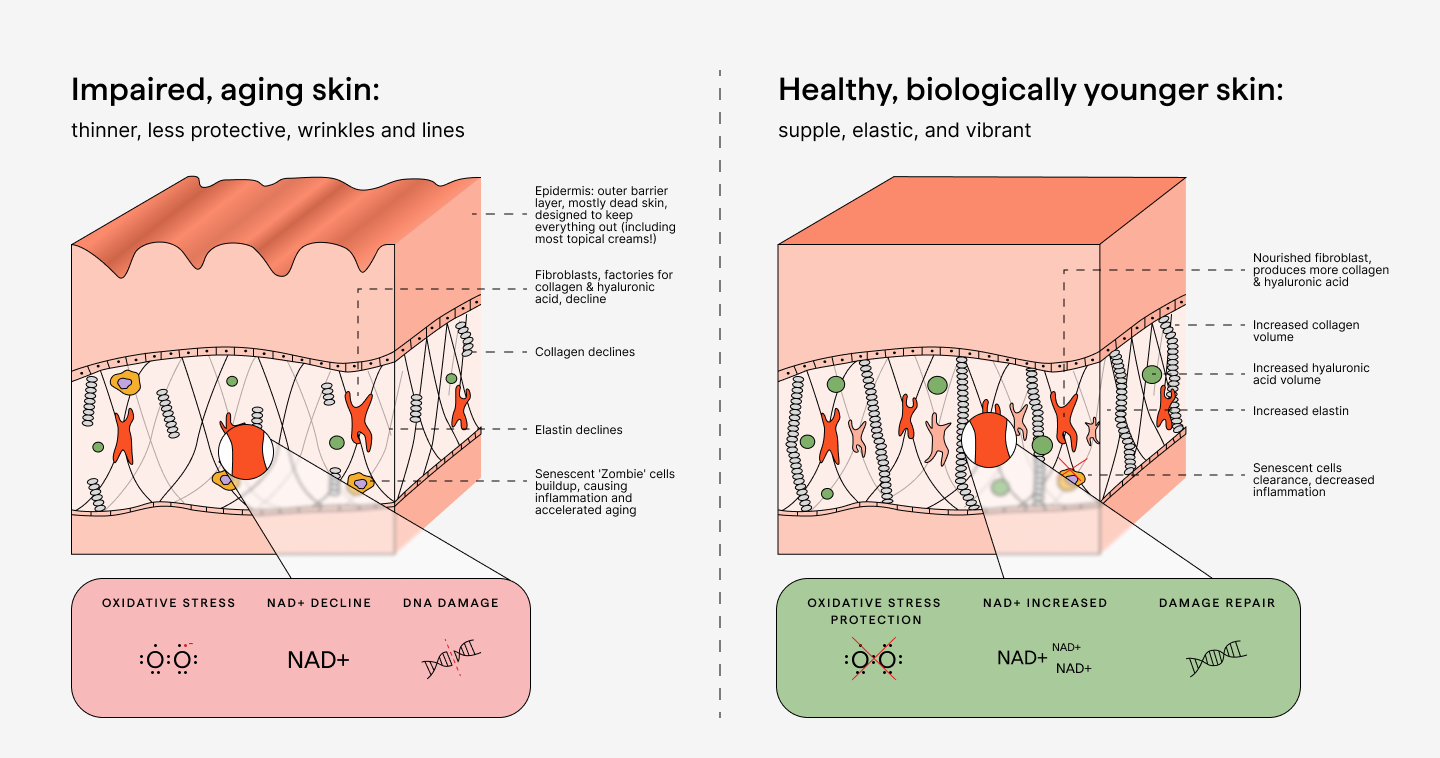
Why it’s different
-
Revolutionizing Collagen Production
For Enhanced Thickness, Firmness, and Elasticity
-
Radical Hydration that Defies Wrinkles
Boost Hyaluronic Acid Production From Within
-
Boost NAD+ Production in Skin
To Activate Cellular Energy
-
Purge Zombie Cells And Broken Proteins
Clear Zombie Cells in Skin, For Whole Body Health
-
Boost antioxidants defense
A barrier for the barrier organ of your body
-
Sunblock, in a Supplement
Defend Skin Against Sun and UV Rays
-
Feeds Your Fibroblasts
The Architects of Skin Youth
-
Restore Beneficial Bacteria
For a Healthier Skin Microbiome
-
Harmonize Youthful Skin Tone
Help Diminish Hyperpigmentation
-
Defy Sugar-Induced Wrinkles
Keep Glycation At Bay
How to use
you, like new
you, like new
you, like new
you, like new
you, like new
you, like new
you, like new
you, like new
you, like new
you, like new
you, like new
you, like new
you, like new
you, like new
you, like new
you, like new
you, like new
you, like new
you, like new
you, like new
you, like new
you, like new
you, like new
you, like new
you, like new
you, like new
you, like new
you, like new
you, like new
you, like new

Look inside
-
Collagen Peptides (VERISOL®)
2,500 mg
Collagen, a vital protein responsible for skin structure and elasticity, diminishes with age, resulting in wrinkles and sagging. But most collagen powders available on the market get broken down as normal amino acids (i.e., proteins), without activating collagen production. We’ve harnessed the power of VERISOL®, a unique patented collagen peptide, and one of the few shown to be effective by multiple human trials to actually target and stimulate collagen production in skin, hair, and nails. These components act as the foundational elements of collagen, stimulating its production, enhancing skin by reducing wrinkles, and improving hydration, elasticity, and firmness (2, 4, 5). 2500 mg is the daily recommended dose of VERISOL® for collagen activation.
-
Hyaluronic acid
150 mg
Our bodies produce less Hyaluronic acid (HA) as we age, leading to dryness and wrinkles. Known as nature's hydration miracle, it helps retain moisture in skin, keeping it plump. Supplementing HA can improve skin hydration and reduce fine lines and wrinkles, whereas applying it topically does not work: HA molecules are too large to pass through the outer skin layer. HA stimulates collagen synthesis, improving skin firmness and elasticity, promotes healing of skin wounds, and has antioxidant properties that can protect skin from sun damage and premature aging. 150 mg is recommended daily dose for optimal skin health (10, 65). To obtain 150 mg of HA from bone broth, you would need to consume approximately 15-50 cups (3.6-12 liters) of bone broth.
-
Ceramides (CeraLOK®)
40 mg
Natural component of the lipidic barrier of the skin that helps maintain its function, preventing moisture loss and keeping the skin hydrated, especially the epidermis. Our skin produces less ceramides as we age, leading to dryness and wrinkles. Ceramides can help improve skin hydration and reduce visible fine lines and wrinkles. CeraLOK®, produced in Japan, has been proven through substantial human studies. CeraLOK® supports enhanced moisturization, hydration, reduced skin roughness, fewer wrinkles, and a brightening effect. Its exceptional absorption and bioavailability are due to its combination with poly-cyclodextrin. CeraLOK® is the only ceramide product incorporating β-sitosterol-3-O-glucoside, contributing significantly to its potency (3, 31, 57). 40 mg of CeraLOK® is the optimal dosage for skin health.
-
N-acetyl-D-glucosamine - NAG
500 mg
A hero in the multi-varied process of skin aging, N-acetyl-D-glucosamine or NAG is a natural compound that can help brighten and even out skin tone. It is a precursor of hyaluronic acid biosynthesis as well as it can also promote collagen production. It was shown to inhibit the glycation process, which is one of the leading causes of dermis matrix degradation, and due to that, it can reduce fine lines and wrinkles. A daily dose of 500 mg of NAG is recommended for maximum benefits (58, 59), but as a compound not commonly found in foods, supplementation is the easiest source. A daily dose of 500 mg of NAG is recommended for maximum skin benefits.
-
Spermidine
1 mg
Spermidine, a naturally occurring polyamine, has garnered attention for its remarkable impact on skin longevity. Its role in enhancing autophagy, the cellular process of self-cleaning, is crucial for maintaining the health and vitality of skin cells. By promoting the removal of damaged cellular components, spermidine helps slow down the skin's ageing process. This effect is further bolstered by its ability to stimulate collagen production, a key element in preserving skin elasticity and firmness. Additionally, its antioxidant properties provide a shield against oxidative stress, a major contributor to skin aging (9, 22).
-
Niacinamide
500 mg
A form of vitamin B3 that can improve skin texture and tone, reduce inflammation, and enhance the skin's barrier function and reduce fine lines and wrinkles. It is a precursor to a longevity molecule NAD+, stimulates collagen and ceramides production (acting on both dermis and epidermis), reduces hyperpigmentation, and increases skin elasticity (8, 61-64).
-
Astaxanthin (AstaZine®)
3.5 mg
Astaxanthin is a natural pigment and a powerful antioxidant in the carotenoid family (found in red marine animals like salmon, krill, and even flamingos). AstaZine® is a certified organic form derived from Haematococcus pluvialis microalgae powder. Astaxanthin has been shown to have photoprotective properties, meaning it can help protect the skin from the damaging effects of UV radiation. It may help reduce sunburn, inflammation, and DNA damage caused by excessive sun exposure. It also helps moisture retention and improves skin tone (29, 36, 37). AstaZine® boasts a wide range of clinically validated health benefits, with 239 approved health claims by the US FDA. 3-6 mg of Astaxanthin is the daily dose recommended for healthy skin and longevity.
-
Vitamin C (Ascorbic Acid)
150 mg
Vitamin C, or ascorbic acid, is a water-soluble vitamin, and among the most well studied ingredients for skin health. It is an essential nutrient, meaning the human body cannot synthesize it, and must be obtained through diet or supplements. Besides its antioxidant function that can help protect the skin against oxidative stress, it triggers collagen production and skin cell division. Uniquely, it targets both intrinsic and extrinsic aging at the dermis level (35). Research has indicated that it can diminish fine lines, wrinkles, and age spots, enhancing skin texture and tone (7, 51).
-
Vitamin E
30 mg
One of the best and well studied antioxidants for skin, with proven synergy with both vitamin C and carotenoids that can protect the skin against damage from free radicals (34). It can improve skin hydration and reduce stress/sun-induced inflammation. Vitamin E also supports immune function, gene expression, and the metabolism of vitamin K. It is involved in maintaining healthy skin, as it can help protect against UV damage and promote skin healing. To get the same amount of vitamin E from your diet, you would need to eat 10 avocados or 15 red bell peppers (52, 53). 30 mg of Vitamin E is the daily dose recommended for healthy skin.
Skin is one of the most important and complex organs, essential for human longevity. With the frontline of longevity science, we are finally able to address its various mechanisms of deterioration, and create a portfolio approach to truly intervene and even reverse aspects of skin aging.
Francois Xavier Pellay, PhD. Longevity molecule hunter, and world renowned skin longevity expert.
Scientific studiеs
-
The study highlights the significant impact of Vitamin C on skin health, underscoring its essential role in the synthesis of collagen, a vital component for maintaining skin structure and elasticity. Vitamin C, a powerful antioxidant, also aids in protecting the skin from oxidative stress caused by UV radiation and environmental pollutants, which can lead to premature aging. Importantly, the study emphasizes the superiority of oral supplementation of Vitamin C over topical application. This is primarily because oral intake ensures a more consistent distribution of the nutrient throughout the body, including the skin. In contrast, the effectiveness of topical application is limited due to the challenges in penetrating the skin barrier and achieving adequate concentrations in the dermis. The study concludes that oral supplementation of Vitamin C is a more efficient method for enhancing skin health, promoting better collagen synthesis, and offering comprehensive protection against oxidative damage (7).
-
Hydrolyzed collagen supplementation has shown positive effects on human skin aging. A systematic review and meta-analysis of 19 clinical trials revealed that oral intake of hydrolyzed collagen for 90 days resulted in reduced skin wrinkles and improved skin hydration, elasticity, and firmness. The study involved 1,125 participants aged 20 to 70 years, predominantly women. Overall, the findings support the effectiveness of hydrolyzed collagen in combating skin aging (4).
-
Ceramides are vital to the skin's lipid barrier, maintaining hydration and protecting against external stressors. Replenishing ceramide levels through supplementation helps strengthen the skin barrier, reducing transepidermal water loss and improving skin moisture levels. This can lead to improved skin elasticity, decreased roughness, and reduce visible signs of aging (68).
-
Cosmeceuticals refer to products containing active substances that fall outside the categorization of cosmetics or drugs. Among these, those with vitamins C, E, and B3 have demonstrated potential benefits for mitigating skin aging. Vitamin C is known for its antioxidant properties and ability to stimulate collagen production, reducing wrinkle appearance and enhancing skin elasticity. Vitamin E also functions as an antioxidant, safeguarding the skin against damage caused by free radicals. Vitamin B3, also known as niacinamide, has positively enhanced the skin's protective barrier, minimized hyperpigmentation, and refined skin texture. (33, 67).
-
Long-term prophylactic astaxanthin supplementation may inhibit age-related skin deterioration and maintain skin conditions associated with environmentally induced damage
Astaxanthin, a potent antioxidant, and anti-inflammatory carotenoid, was evaluated for its anti-inflammatory effects on skin deterioration. In vitro, experiments demonstrated that astaxanthin reduced inflammatory cytokine secretion in keratinocytes and matrix metalloproteinase-1 secretion in UVB-irradiated fibroblasts. A 16-week clinical study involving 65 healthy female participants found that oral administration of astaxanthin (6 mg or 12 mg) prevented the worsening of wrinkle parameters and skin moisture content compared to the placebo group. Additionally, interleukin-1α levels in the stratum corneum increased in the placebo and low-dose groups but not in the high-dose group (36).
-
N-acetyl-D-glucosamine is a hyaluronic acid precursor accelerating wound healing, improving skin hydration, and decreasing wrinkles.
N-Acetyl-D-glucosamine (NAG) is a naturally occurring form of glucosamine that is structurally analogous to components found in the human body. Its bioavailability, or the ease with which the body can absorb and utilize it, is reported to be three times greater than other forms of glucosamine. Glucosamine and its derivative, N-acet-D-glucosamine, have important bodily functions, including the synthesis of hyaluronic acid and proteoglycans (69). They have been shown to provide various benefits for the skin, such as promoting wound healing, improving skin hydration, reducing wrinkles, and inhibiting melanin production for hyperpigmentation treatment (59).
-
Recovery of Human Dermal Structure and Barrier Function Induced by Spermidine through the Skin Microbiome.
This study reveals the significant role of Streptococcus species, particularly S. pneumoniae, S. infantis, and S. thermophilus, in improving skin structure and barrier function, contributing to anti-aging. The numbers of these bacteria is higher in younger individuals or those with more elastic skin, and their secretions, especially spermidine, enhance collagen and lipid synthesis in aged cells. These findings highlight the potential of leveraging the skin microbiome, particularly Streptococcus-secreted compounds like spermidine, in developing anti-aging skincare treatments (9).
-
The evolving role of the NAD+/nicotinamide metabolome in skin homeostasis, cellular bioenergetics, and aging
NAD (Nicotinamide Adenine Dinucleotide) plays a crucial role in maintaining skin health and combating aging. Daily environmental factors, especially solar radiation, induce oxidative stress, disrupting skin's normal functioning and accelerating aging. This stress depletes NAD+ and ATP levels, affecting cellular energy and leading to chronic damage, particularly in mitochondria. NAD+ and its precursor, nicotinamide, are key to skin homeostasis. They are linked to dietary requirements and are beneficial in treating inflammatory conditions, preventing photoaging, and reducing cancer risk. Aged skin shows lower NAD+ levels, and nicotinamide supplementation can help restore these, mitigating energy dysfunction. It protects dermal fibroblasts from oxidative damage, enhances mitochondrial efficiency, and supports selective mitophagy through sirtuin activation. NAD+ levels are dynamic, influencing cellular metabolism, mitochondrial function, and circadian rhythms. Understanding NAD+'s role in skin biology is vital for developing interventions to maintain skin health and cellular bioenergetics, especially against UV-induced stress (14).
-
Spermidine, a natural polyamine found to decline with age, has emerged as a significant factor in promoting longevity. This groundbreaking study reveals that spermidine supplementation remarkably extends the lifespan of yeast, flies, worms, and even human immune cells. Moreover, it offers potent protection against oxidative stress in aging mice. The key to spermidine's efficacy lies in its ability to induce epigenetic changes, particularly the deacetylation of histone H3. This process, driven by the inhibition of histone acetyltransferases (HAT), leads to reduced oxidative stress and necrosis in aging yeast. On the flip side, reduced levels of endogenous polyamines correlate with increased acetylation, reactive oxygen species production, early necrotic death, and a shortened lifespan. Spermidine's impact extends to upregulating autophagy-related transcripts, thereby triggering autophagy in various organisms and human cells. This enhanced autophagy is essential for spermidine's role in suppressing necrosis and boosting longevity, underscoring its potential as a powerful anti-aging intervention (22).
-
VERISOL®, a specific bioactive collagen peptide (BCP), has been clinically proven to be effective in reducing skin aging, particularly eye wrinkle formation. In a rigorous double-blind, placebo-controlled study involving 114 women aged 45-65, participants receiving 2.5 g of VERISOL® daily for 8 weeks showed a significant reduction in eye wrinkle volume. Notably, this effect persisted even four weeks after ceasing intake, highlighting its lasting benefits. Beyond just wrinkle reduction, VERISOL® remarkably enhanced the skin's internal structure. After 8 weeks of consistent use, there was a substantial increase in the skin's procollagen type I content by 65% and elastin by 18%, compared to those on a placebo. These components are crucial for maintaining skin elasticity and firmness. Although the increase in fibrillin was a modest 6%, VERISOL®'s overall impact on enhancing dermal matrix synthesis is evident. These findings underscore VERISOL®'s efficacy in not only visibly reducing wrinkles but also improving the skin's overall health and youthful appearance from within (25).
Your personal longevity kit, engineered for life
More than just a supplement, each product is a complete protocol and lifestyle program, synergistically formulated to work best together, and with ongoing use.
One-Time Purchase
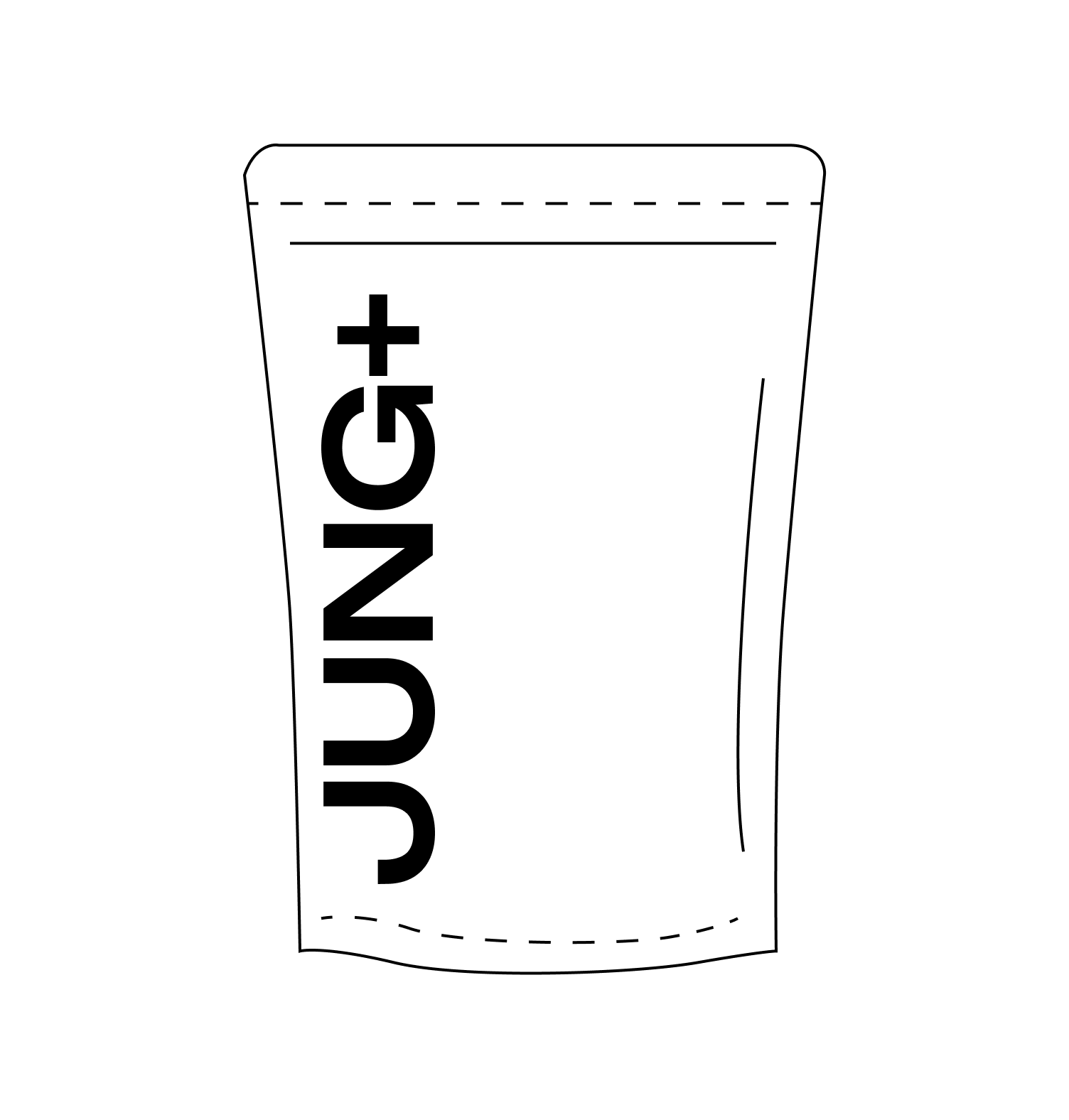
Receive a pouch filled with a one month supply of any product
Subscribe to unlock VIP benefits
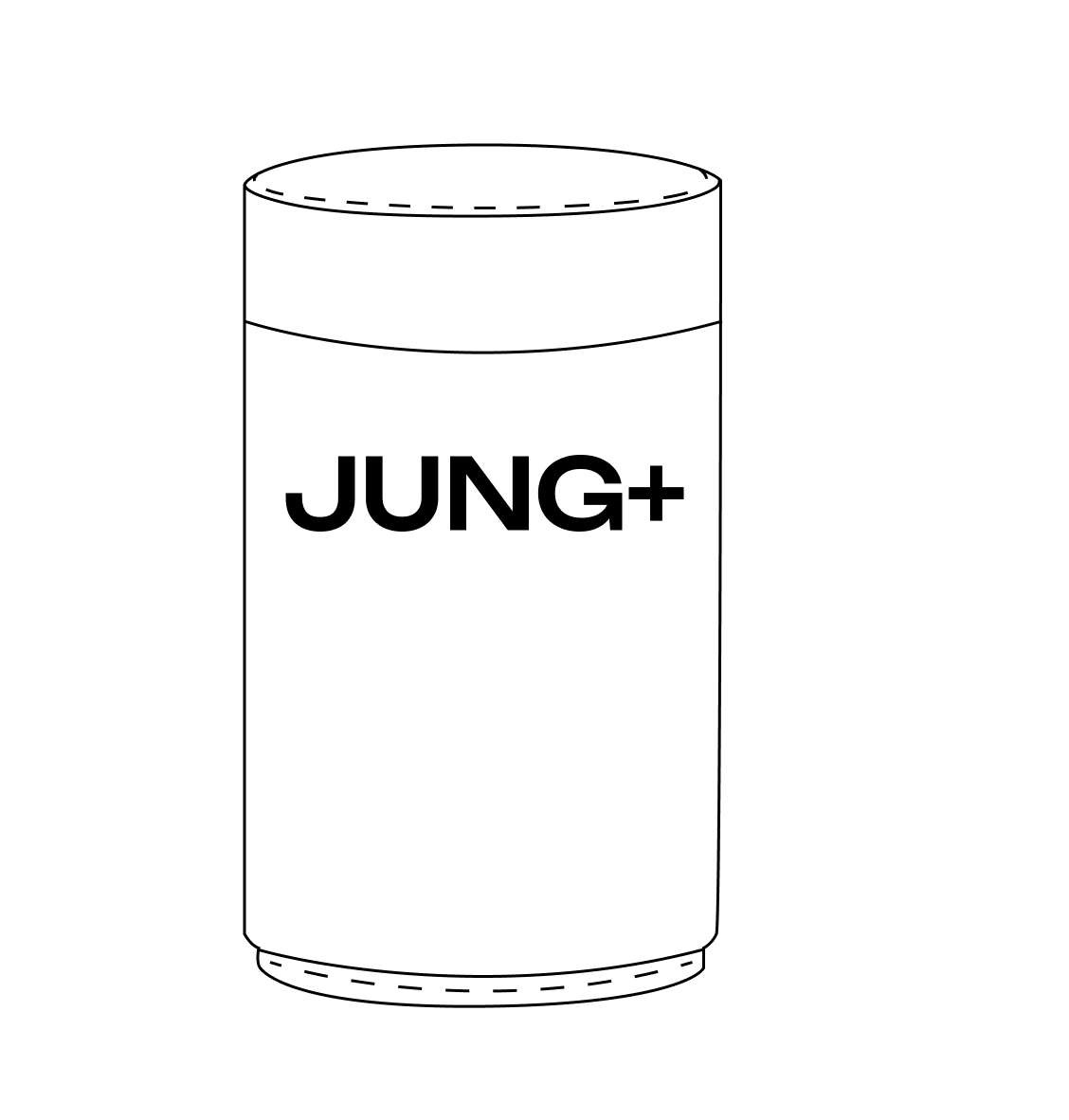
Your welcome kit includes a free storage canister to store your monthly delivery. 100% metal and recyclable, for you, and for the planet
+ Free coaching and scientific guidance, delivered straight to your inbox
+ Up to 30% off subscriptions, cancel anytime
+ White glove, subscribers-only access to the team for questions on your longevity protocol
+ Constantly updated formulas that track the latest science, so you don’t have to
+ First in line benefits for new products, special discounts, and features
Here's what our customers say
-
Feeling unstoppable
I forgot what it felt like to feel energized. I was so overrun with fatigue for many years that I just got used to it but once I started taking Jung, I began to feel more alert, have stronger performance both mentally and physically, and my mood elevated as well. In the gym, I was instantly able to lift more weights and feel that I was able to perform sprints more easily. I recover more quickly from the hard training that I do and overall, I feel fantastic!
-
Youth in a pill
Makes me feel amazing!
-
I feel like I have gotten younger
I simply feel like I have more energy to do everything. This is like a caffeine jolt without any of the side effects. I am hoping these results continue and build on what is currently happening? I'm willing to continue for a couple of months to find out.
FAQ’s
-
How should I take Cellular Skin Renewal?
-
Are there any known side effects?
-
How long does it take to see results with Cellular Skin Renewal?
-
Does Cellular Skin Renewal replace a healthy skincare routine?
-
Can Cellular Skin Renewal cure skin conditions or diseases?
-
Can I take Cellular Skin Renewal if I'm already taking other skincare supplements?
-
What else can I do to enhance the effectiveness of Cellular Skin Renewal.
100% Money Back Guarantee
At Jung, we believe in the power of our products and want you to feel confident in your purchase. That’s why we’ve partnered with Onward to offer an unmatched money-back guarantee. With Onward VIP Protection, your purchase is covered by a full money-back guarantee. If you’re not completely satisfied, simply return the product for a hassle-free refund.
100% Money Back Guarantee
Pairs well with Longevity Foundation
Jung+ boosters have been precision engineered to work synergistically with our Master Formula. Combine your booster with Longevity Foundation to create a complete longevity protocol that targets aging at the cellular level, and goes further to turbocharge your health goals and amplify your unique lifestyle.


Longevity Foundation
Welcome to the future of anti-aging. Devised by world-leading longevity experts, our foundational formula works around the clock to tackle aging at its roots, addressing all 12 known drivers of aging with precision.
















References
-
Reference link
1. Tzaphlidou M. The role of collagen and elastin in aged skin: an image processing approach. Micron. 2004;35(3):173-7.
-
Reference link
2. Bolke L, Schlippe G, Gerß J, Voss W. A Collagen Supplement Improves Skin Hydration, Elasticity, Roughness, and Density: Results of a Randomized, Placebo-Controlled, Blind Study. Nutrients. 2019;11(10).
-
Reference link
3. Sun Q, Wu J, Qian G, Cheng H. Effectiveness of Dietary Supplement for Skin Moisturizing in Healthy Adults: A Systematic Review and Meta-Analysis of Randomized Controlled Trials. Front Nutr. 2022;9:895192.
-
Reference link
4. de Miranda RB, Weimer P, Rossi RC. Effects of hydrolyzed collagen supplementation on skin aging: a systematic review and meta-analysis. Int J Dermatol. 2021;60(12):1449-61.
-
Reference link
5. Proksch E, Segger D, Degwert J, Schunck M, Zague V, Oesser S. Oral supplementation of specific collagen peptides has beneficial effects on human skin physiology: a double-blind, placebo-controlled study. Skin pharmacology and physiology. 2014;27(1):47-55.
-
Reference link
6. Schunck M, Zague V, Oesser S, Proksch E. Dietary Supplementation with Specific Collagen Peptides Has a Body Mass Index-Dependent Beneficial Effect on Cellulite Morphology. J Med Food. 2015;18(12):1340-8.
-
Reference link
7. Pullar JM, Carr AC, Vissers MCM. The Roles of Vitamin C in Skin Health. Nutrients. 2017;9(8).
-
Reference link
8. Bissett DL, Oblong JE, Berge CA. Niacinamide: A B vitamin that improves aging facial skin appearance. Dermatologic surgery : official publication for American Society for Dermatologic Surgery [et al]. 2005;31(7 Pt 2):860-5; discussion 5.
-
Reference link
9. Kim G, Kim M, Kim M, Park C, Yoon Y, Lim D-H, et al. Spermidine-induced recovery of human dermal structure and barrier function by skin microbiome. Communications Biology. 2021;4(1):231.
-
Reference link
10. Bukhari SNA, Roswandi NL, Waqas M, Habib H, Hussain F, Khan S, et al. Hyaluronic acid, a promising skin rejuvenating biomedicine: A review of recent updates and pre-clinical and clinical investigations on cosmetic and nutricosmetic effects. International journal of biological macromolecules. 2018;120:1682-95.


















